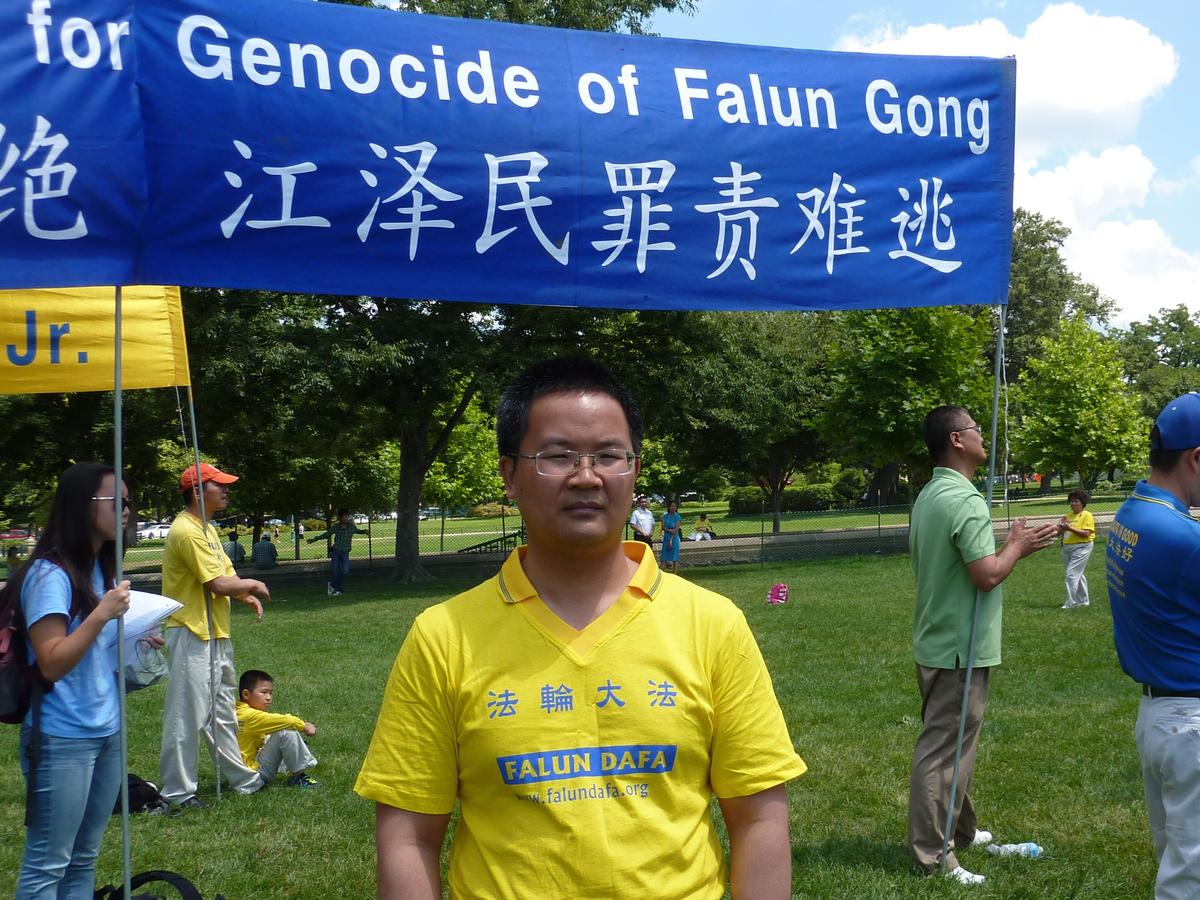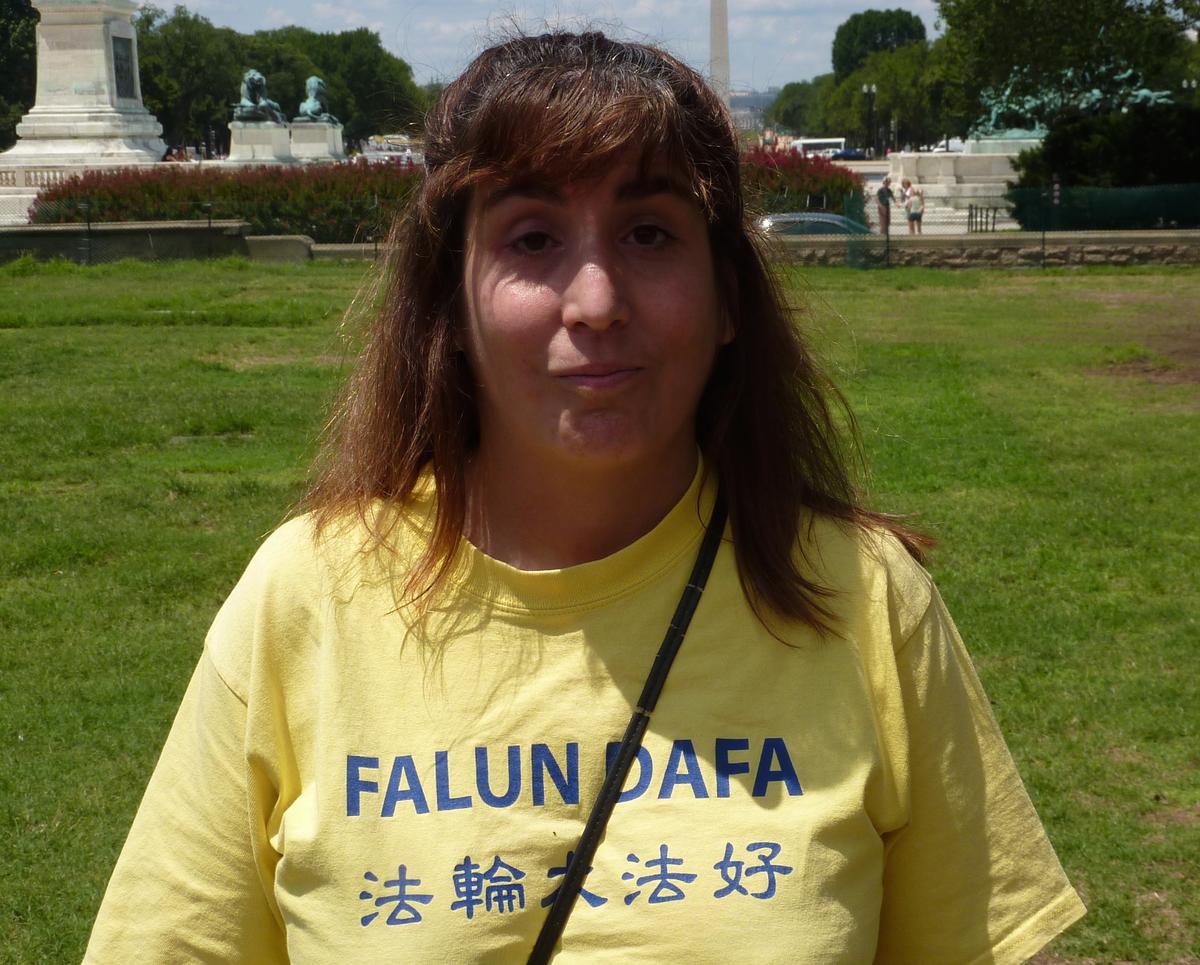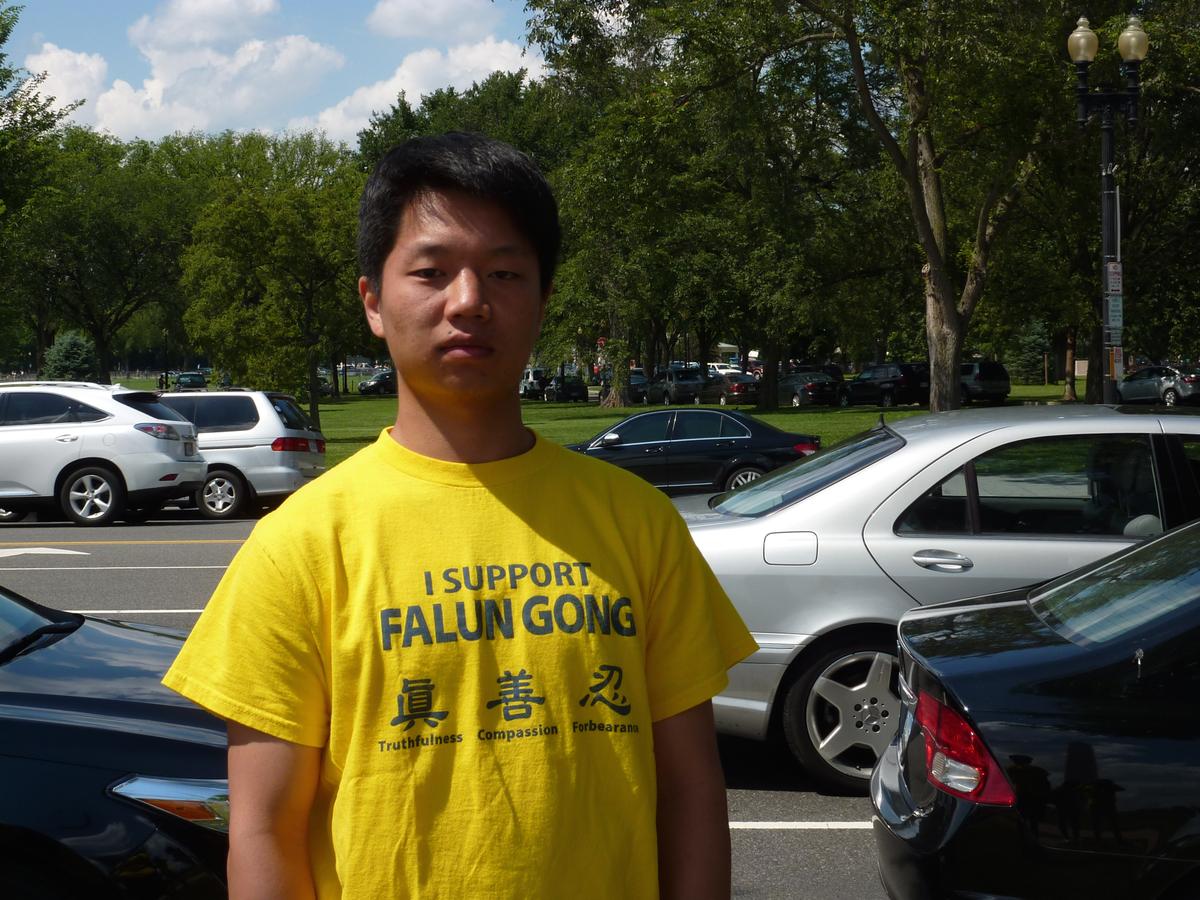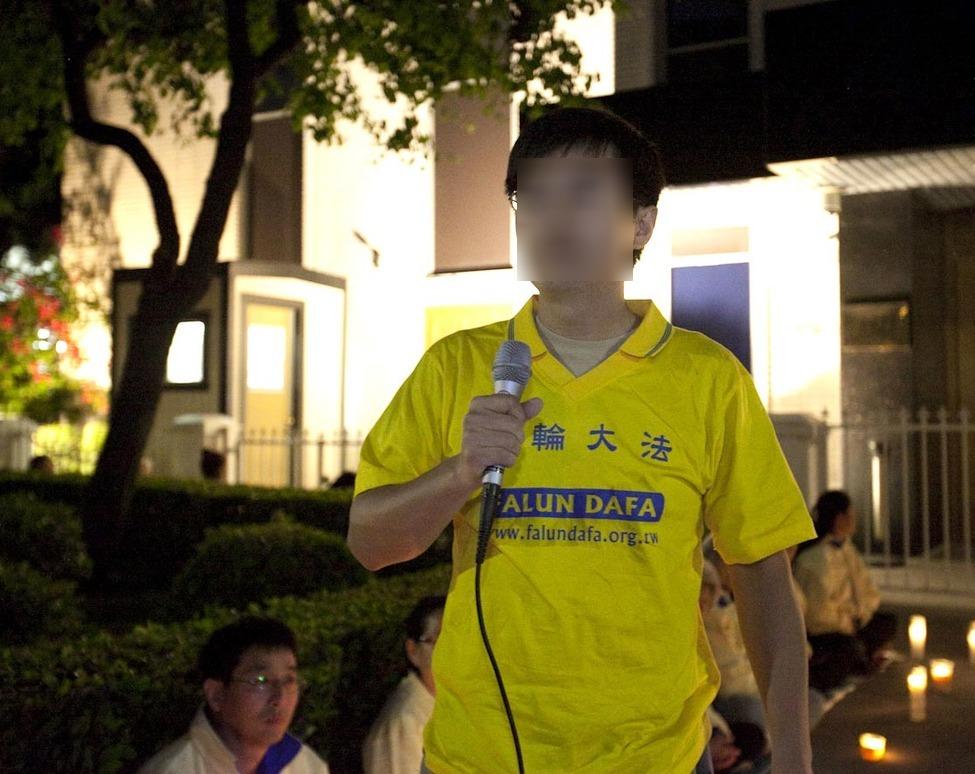On July 20th, 1999, the Chinese Communist Party (CCP) launched its brutal persecution of Falun Gong, a peaceful cultivation practice based on the principles of Truthfulness, Compassion, and Tolerance. Even though the practice was introduced just a few years prior, there were over 100 million practicing Falun Gong in China by 1999.
For the past 15 years, the CCP has been ruthlessly persecuting these practitioners, as well as their family members. Their methods of harassment not only affect those in China, but also those who practice Falun Gong (also called Falun Dafa) around the world, such as the United States, Argentina, and Canada.
These are the stories of a few practitioners who all have incredibly different backgrounds, but they all traveled to Washington D.C. on July 17 to join many others with one common goal: to end the persecution of Falun Gong in China.
Zhongmin Li

(Epoch Times)
Fifteen years ago, on July 20, 1999, the Chinese Communist Party (CCP) launched a persecution against Falun Gong in China and has been brutalizing practitioners ever since.
Zhongmin Li, a Falun Gong practitioner from China, says that he remembers July 20, 1999 very clearly: “The clouds covered the sun in reality … the sun didn’t shine anymore on that day.”
He was doing the practice outside that morning with other Falun Gong practitioners, when policemen showed up and told them they we no longer allowed to do that in public. Armed semi-military men were sent to take the Falun Gong practitioners to a large jail in Beijing, where the Chinese Communist Party leaders took down the names of all practitioners.
“That’s how they can follow and check every Falun Gong practitioner because they have a system, a very comprehensive system that records every Falun Gong practitioner. They had archives of these documents. This document will follow you everywhere, whether you go to work, you go to school, so you will have a secret document mentioning that you are a Falun Gong practitioner,” Zhongmin explained.
When his mother found out about Zhongmin’s arrest, she couldn’t say a single word and fainted. Even though Zhongmin is in the United States now, he says his family still worries that he will be persecuted here.
Zhongmin was detained in a forced labor camp for one year, which was added to his record. After graduating with a Master’s degree, he could not find a job due to the secret document that followed him around.
“The CCP branch of my school would talk to the CCP branch of my workplace. They asked me to write materials to denounce Falun Gong but I refused, so then I couldn’t get a job. This is how it is for all students who practice Falun Gong. When he or she goes to work there will be censorship and he cannot get any official job in the government or at school. Even a state-owned enterprise, they can’t go there.”
With nowhere to turn, he had no choice, but to stay in school. After receiving his PhD, it was still incredibly difficult to find a job because of the political censorship:
“Every Chinese person has a house registration number, and if you move or go to work, your household registration will move with you to the local police station. And if you’re a Falun Gong practitioner, the local police station will not receive your documents, they‘ll reject them. And they’ll come to your home to talk to you and ask you to write material denouncing Falun Gong.”
However, this persecution is not popular among those living in China. There are many who know that those who practice Falun Gong are good, kind-hearted people. With the help of some people who support the practice, Zhongmin was able to find a job and then eventually leave China.
“This persecution is very serious, and is against the conscience of the Chinese people, and it’s against the humanity of the world. So I hope that more people will support the end of the persecution,” Zhongmin said.
Zhongmin is not only advocating the end of the persecution due to his personal experience, but also because he has friends and family who are affected as well.
“The persecution put me in a forced labor camp for one year, and some of my friends. Most of them are professors – well educated people in China, they were persecuted to death.”
Sylvia Glizer

(Epoch Times)
Gleizer travelled all the way from Argentina to Washington D.C. in hopes of urging people around the world to realize the seriousness of the Falun Dafa persecution in China. She wants people to know how practitioners are wrongly persecuted in China, and that it has already lasted for 15 long years.
Gleizer stated: “Falun Dafa practitioners are really good people who are striving to be better people in the society and in their daily lives. People around the world aren’t aware about this.”
Gleizer started practicing Falun Dafa in 2001, and has seen noticeable improvements in her life such as being able to give up smoking and being completely cured of asthma. When she first heard about the persecution of Falun Dafa, she was shocked that something so wrong was happening in today’s world and felt the need to do something to stop this crime against humanity.
During Hu Jintao’s visit to Argentina, Gleizer went with a group of practitioners to make a peaceful appeal, asking him to stop the persecution of Falun Dafa. The Chinese authorities accompanying Hu responded by physically assaulting Gleizer and her fellow practitioners and confiscating their banners.
Gleizer says her main purpose of participating in the events in Washington D.C. is to demonstrate that people from all around the world are against the persecution of Falun Gong. She believes that when people see something wrong happening but don’t act or say anything against it, they are essentially taking part in the wrongdoing.
Youqi Zheng

(Epoch Times)
Zheng was born in China and moved to Canada at the age of 4.
Zheng recollects being with his grandparents at home in China, watching T.V. with his grandmother while his grandfather was practicing the Falun Gong exercises near the window. A passing by police officer spotted his grandfather, and immediately took him away.
Zheng said he remembers being scared and starting to cry. His grandfather was soon released from custody after Zheng’s parents worked to free him. After this incident, his family moved to Canada.
Zheng says that because someone who was so close to him was taken away by the police, he really wants to support the other Falun Dafa practitioners in China who have lost their lives due to the persecution.
He stated: “I strongly believe that everyone is allowed to be free and have the freedom to practice whatever they want. People around the world are allowed to practice Falun Dafa freely, but in China alone the practice is banned. This is wrong and the persecution must end.”
Kevin Tie

(Epoch Times)
Tie was born in China and moved to the United States at the age of 3. His parents started practicing Falun Dafa in 1996. This summer, Tie participated in a study abroad program in China, which was his first time visiting since he moved away 17 years ago. Previously, he had never had an opportunity to go back to China because his father’s name has been blacklisted by the Chinese Communist Party.
Tie said that in the past, his family members in China were harassed and questioned about his parents’ whereabouts and authorities asked if they still practiced Falun Dafa.
Tie said: “I had once given a speech at one of the Falun Dafa Conferences in the United States. The CCP found out somehow and questioned my relatives in China about my whereabouts.”
According to Tie: “The persecution of Falun Dafa hasn’t ended because the governments around the world haven’t taken the situation seriously and acted against the persecution ... The other reason is that people around the world aren’t really aware about the situation.”
Tie came to D.C. to commemorate those who have lost their lives in the persecution. He and his family, hope to see the persecution end soon.
Mr. Liu

Mr. Liu requested anonymity to protect his family members in China. (Epoch Times)
Liu is a 46-year-old Falun Gong practitioner who came to the United States from China just two months ago, in May 2014.
“The first time I was arrested was in 2003, and I was put in a labor camp for 1.5 years. The second time was in 2007 before the 2008 Summer Olympics in Beijing. Because there were going to be large amounts of people from all around the world coming for the Olympics, the government arrested many Falun Gong practitioners so that they couldn’t cause any trouble. It was then that I was detained for 7 years.”
His family members, even though they did not practice Falun Gong, were removed from their influential positions at work. They were not allowed to have high positions in their respective fields.
“My wife is an air hostess, but because she had the ability to directly get airplane tickets with her ID, she lost her job because she’s married to me.”
Having practiced since 1997, Liu witnessed the start of the persecution and the 15 years since. Though the first time he was arrested was in 2003, the Chinese Communist Party had always been aware that he was a practitioner and constantly monitored him.
Every year, Liu was taken to the police station along with all of the other local Falun Gong practitioners on four specific days: April 25 (the day 10,000 practitioners went to the government compound in Beijing to appeal the first round of arrests in 1999), July 20 (the official day the persecution began), Chinese New Year, and China National Day.
According to Liu: “We would be taken to the police station for those days and we couldn’t do anything; they would only let us drink some water.”
Liu shared about his 7-year imprisonment: “I was detained in the Zheng Zhou prison. It’s a very bad place. The scars on my body are all from when they beat me. Here I have permanent marks on my ankles from when they cuffed me and hung me up. They didn’t have any evidence or reason for detaining me.”
Once he was released, he applied for a tourist visa so that he could come to the United States.
Attending the activities in Washington, D.C. to commemorate the start of the persecution in China exemplifies Liu’s attitude. His primary goal is to help end the persecution, to tell everyone about the real situation in China.
“I don’t want them to believe the lies that the government tells the people. This is what I can do by coming to America.”




